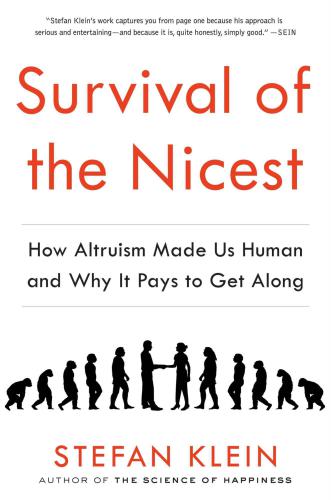
Survival of the Nicest
How Altruism Made Us Human and Why It Pays to Get Along
کتاب های مرتبط
- اطلاعات
- نقد و بررسی
- دیدگاه کاربران
نقد و بررسی

Starred review from February 10, 2014
Klein (The Secret Pulse of Time: Making Sense of Life's Scarcest Commodity) transforms Darwinian interpretation of evolution and resets the conversation about how we relate to each other as individuals and communities in this mind-bending book. Klein's inquiry fuses the work of neuropsychologists, neuroeconomists, geneticists, philosophers, anthropologists, a chemist, and a lion expert, with myriads of studies conducted in cultures around the world. He distinguishes, then connects dots, between abstract concepts, using the growing body of fMRI experiments to illustrate biological activations of sharing, empathy, sympathy, selflessness and his main subject, altruism. He then he applies familiar behavioral models, including the Prisoner's Dilemma, in constructing new arguments. His main pointâthat over time evolution has favored cooperationâis simple but profound and so astutely argued that if there is a science to winning readers over, Klein has surely mastered it. Far from pedantic or sententious, the wealth of knowledge here is astounding. His conviction history, empirical facts and ongoing discoveries about human characteristics and societies serve as a roadmap for a better world.

December 15, 2013
A middling look at some of the better angels of our nature by German science writer Klein (Leonardo's Legacy: How Da Vinci Reimagined the World, 2010, etc.). We owe to scientist W.D. Hamilton the philosophically rich observation that altruism might have arisen as a function of natural selection by widening our sense of who is kin to us to include people beyond our immediate gene pool--i.e., we help do our bit to ensure the survival of the species. Klein takes a little of the biological edge off Hamilton's apercu by writing of "the impulses that lead us to seek our own happiness in the happiness of others," impulses that would sometimes seem to contradict our rotten record at being chimps with guns. Some of Klein's statements verge on hyperbolic: Do most of us really make "selfless choices dozens of times every day"? Perhaps so, if we include holding the door open for someone or leaving a tip for the wait staff. Happily, Klein brings the often overlooked work of Pyotr Kropotkin into the discussion; the Russian anarchist prince argued against the sometimes-Hobbesian view of Darwin by asserting that members of species committed acts of mutual aid as much as they competed with each other, Ayn Rand and her lot notwithstanding. Granted that some of Klein's characters are contrarians--John von Neumann, founder of game theory and model for Doctor Strangelove, famously insisted that there was nothing wrong with America's bombing the Soviet Union before the Russians could bomb us--he does a good job of bringing current science into view, from psychology and biology to economics. Even so, the argument seems a little diffuse and soft and would have benefited from more rigor in place of bromides such as "selflessness makes us happy and transforms the world." Tougher-minded readers will prefer Steven Pinker's The Better Angels of Our Nature (2011) and even Prince Kropotkin himself.
COPYRIGHT(2013) Kirkus Reviews, ALL RIGHTS RESERVED.

























دیدگاه کاربران